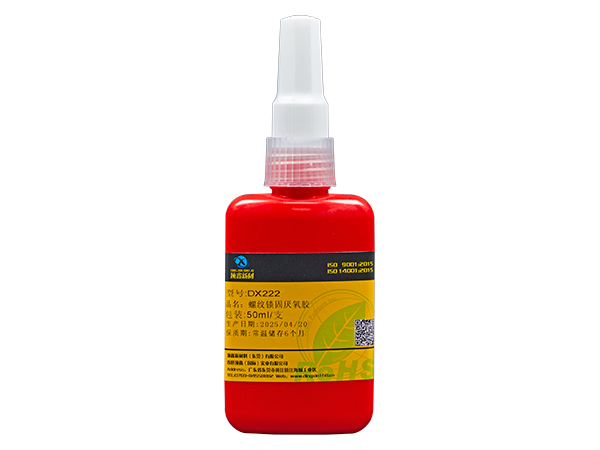1. Product Description:
| Composition |
Single component |
| Strength |
High intensity |
| Viscosity |
Medium viscosity, thixotropy |
| Curing mechanism |
Anaerobic |
| Application |
Thread locking |
2. Typical use:
DX222 universal type, can be used for locking and sealing M2-M12 threads. Has a certain degree of lubricity and can accurately achieve locking strength. After the air between the threads is isolated, the curing process begins immediately. Can prevent loosening and leakage caused by impact and vibration. It is a thread locking agent that can be disassembled with ordinary tools.
3. State before solidification:
| Chemical type |
Methacrylate ester |
| Color |
Purple |
| Specific gravity @ 25 ℃ |
1.05 |
| Viscosity@25℃,cp Brookfield-RVT
rotor 3@20rpm |
850-1550 |
| flash point/℃ |
﹥93 |
4. Typical curing characteristics and properties after curing:
Working temperature range: -54~150 ℃
Curing speed (initial curing/full curing): 20 minutes/24 hours

The curing speed depends on the substrate used. The above figure shows the relationship between the failure torque and time on M10 bolts and nuts of different materials.
Physical performance:
Thermal expansion coefficient ASTMD696,K:80×10
thermal conductivity ASTMC177,W·m·K:0.1
M10 steel nuts and bolts are cured at 22 ℃ for 1 hour
Destructive torque ISO-10964(N·m):1-9
Average disassembly torque ISO-10964(N·m):0.5-5.7
M10 steel nuts and bolts are cured at 22 ℃ for 24 hours
Destructive torque ISO-10964(N·m):2.8-9
Average disassembly torque ISO-10964(N·m):1.1-5.7
M10 galvanized nuts and bolts are cured at 22 ℃ for 24 hours
Destructive torque ISO-10964(N·m):1.1-4.5
Average disassembly torque ISO-10964(N·m):0.5-2.8
Chemical/solvent resistance test:
Aging for 1000 hours under the following conditions and testing at 22 ℃.
| Environment |
Remaining rate of initial strength/% |
| thermal ageing |
100 |
| Engine oil at 150 ℃ |
100 |
| Brake fluid at 150 ℃ |
85 |
| 50/50 ethylene glycol/water @ 120 ℃ |
80 |
| Water at 100 ℃ |
80 |
| Gasoline at 25 ℃ |
95 |
| Diesel @ 25 ℃ |
100 |
| Ethanol at 25 ℃ |
95 |
5. Usage:
Assembly:
1、 For optimal results, thoroughly clean the inner and outer surfaces of the threads with DX755 cleaning agent and air dry.
2、 If the material is an inert metal, spray the accelerator DX7649 on the mating surface and let it dry.
3、 Shake well before use.
4、 To prevent glue from blocking the glue nozzle, avoid the nozzle from coming into contact with metal substances.
5、 Apply sufficient adhesive to the mating area of the threads, and do not apply it to the first section of the threads. The adhesive width should be 3-5 threads. For larger threads and clearances, the amount of glue applied can be adjusted and the product can also be applied to the internal threads.
6、 Tighten the threads using regular methods until they are in the correct position. Reached maximum intensity after 24 hours.
disassemble:
1、 Use standard disassembly tools to disassemble.
2、 In rare cases, due to the long fitting length, it is impossible to disassemble at room temperature. The bolts and nuts can be locally heated to 232 ℃ and disassembled while they are still hot.
clean:
For solidified glue, it can be soaked in gasket remover DX790 or mechanically polished with tools such as steel brushes.
6. Storage conditions:
1、 This product should be stored in a dry and cool place, with an ideal storage temperature of 18-26 ℃.
2、 To avoid contaminating unused adhesive, do not pour the poured adhesive back into the original packaging container.
3、 Keep away from children.
Declaration: This manual is true and reliable. The data can only be used as a reference. We are not responsible for any results obtained by anyone using methods beyond our control. If the customer uses a method of use not mentioned in this manual, the consequences shall be borne by the customer themselves. It is recommended that users conduct experiments based on the data provided in this article before formal use. Customers should be responsible for whether the product meets the usage requirements. Our company clearly declares that we are not responsible for any inevitable or accidental losses, including losses in terms of profits





